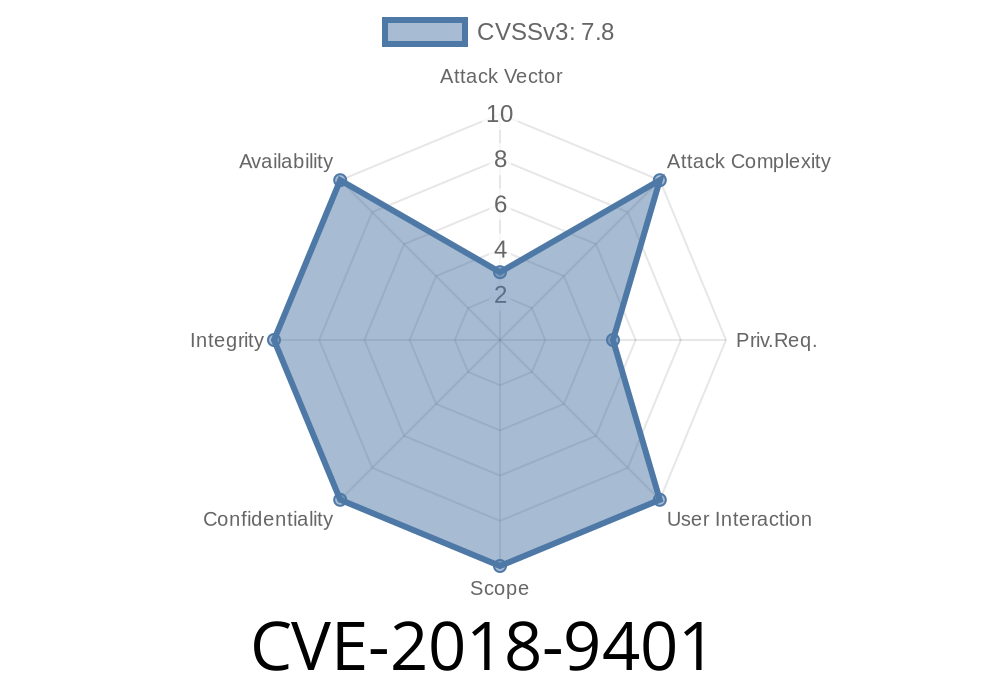In 2018, Android’s Linux kernel was hit by a subtle yet dangerous vulnerability: CVE-2018-9401. This flaw allowed normal apps—or even unprivileged code—to reach into the protected world of kernel memory from user space. That’s bad news, because the kernel is supposed to be the most secure and isolated part of any operating system.
Let’s break down what happened, examine the exploitable flaw, and walk step-by-step through how an attacker could have used it for local privilege escalation—all explained in clear, simple terms.
What was wrong?
An *incorrect bounds check* in the kernel let user-space processes peek (and sometimes poke) into kernel memory.
How dangerous was it?
It allowed a *local* attacker (someone running code on the device) to potentially escalate privileges, reading or even modifying kernel data.
Did it need interaction?
No user interaction was needed. No phishing, no rogue links—just running a piece of code locally.
In Detail: What Is an Incorrect Bounds Check?
In programming, a *bounds check* makes sure you don’t access memory outside an allowed range. It’s like checking that you’re not reading past the end of a file.
If this check is done wrong, programs can accidently or maliciously read memory they shouldn’t.
In the kernel’s case, this is a big deal. The kernel controls everything on your system. If a process could access kernel memory, it might snoop on sensitive data, change system settings, or even hijack the system.
Where Did the Vulnerability Live?
This bug was found in parts of the Android kernel that handled user pointers—memory addresses passed as inputs from user apps.
Will copying data here cause problems?
But in this vulnerable case, the check wasn’t strict enough. The function would sometimes accept user-supplied data (such as addresses or lengths to copy) that, when processed, permitted access to unintended parts of memory.
Example: Exploit in Code
Let’s look at how an attacker might exploit this bug, using C code concepts. (This is a *simplified illustration*—exploits use many tricks and are device-specific.)
Suppose the kernel has a function like this (pseudo-code)
int vulnerable_copy_to_user(void __user *to, const void *from, size_t n) {
if (/* not a valid user pointer check */) {
return -EFAULT;
}
// The bug is in the missing/bad bounds check here!
memcpy(to, from, n); // Dangerous if 'to' reaches into kernel memory
return ;
}
The problem: If to points into kernel memory, or n is big enough, the user can trick the kernel into reading/writing protected data.
Read sensitive info: Keys, tokens, credentials.
- Write/patch kernel structures: Escalate privileges.
And passing large lengths to certain syscalls,
Can let userland code *trick* the kernel into copying beyond its intended bounds. The exploit flow may look like:
#define TARGET_ADDR ((void*)xFFFF000) // (Pseudo) address near kernel space
void try_exploit() {
char buffer[16] = {};
size_t huge_length = 4096; // Suspiciously large
// Syscall affected by CVE-2018-9401
syscall(VULNERABLE_SYSCALL, TARGET_ADDR, buffer, huge_length);
// Now buffer may contain data from kernel memory!
}
> Note: This is illustrative only; real-world attacks make use of device-specific details.
No special permissions were needed—just the ability to run code on the device.
- An attacker with code execution *as a regular app* could leverage this to root the device or to defeat sandboxing.
- The *lack of user interaction* makes this particularly dangerous for targeted attacks (such as by malicious apps).
Mitigation and Patching
Google & Android vendors responded by releasing patched kernels with *proper bounds checks*—ensuring user pointers never reach protected memory.
References
- NVD Entry: CVE-2018-9401
- Android Security Bulletin - October 2018
- Google AOSP Commit Fixing CVE-2018-9401
- Writeup: Escalating Android Privilege via Copy Bugs (blog post) *(similar vulnerabilities)*
Conclusion
CVE-2018-9401 is a classic reminder: Small mistakes in kernel code have big consequences. A missing or incorrect bounds check exposed kernel memory to attack, opening the door for local privilege escalation. Thanks to quick patching and open disclosure, Android users were protected—but the lesson stands for all system software: always validate those user inputs, and never trust the unchecked!
Stay safe, keep your systems updated, and always scrutinize your lowest-level code.
Timeline
Published on: 01/18/2025 00:15:24 UTC
Last modified on: 03/24/2025 17:15:12 UTC
